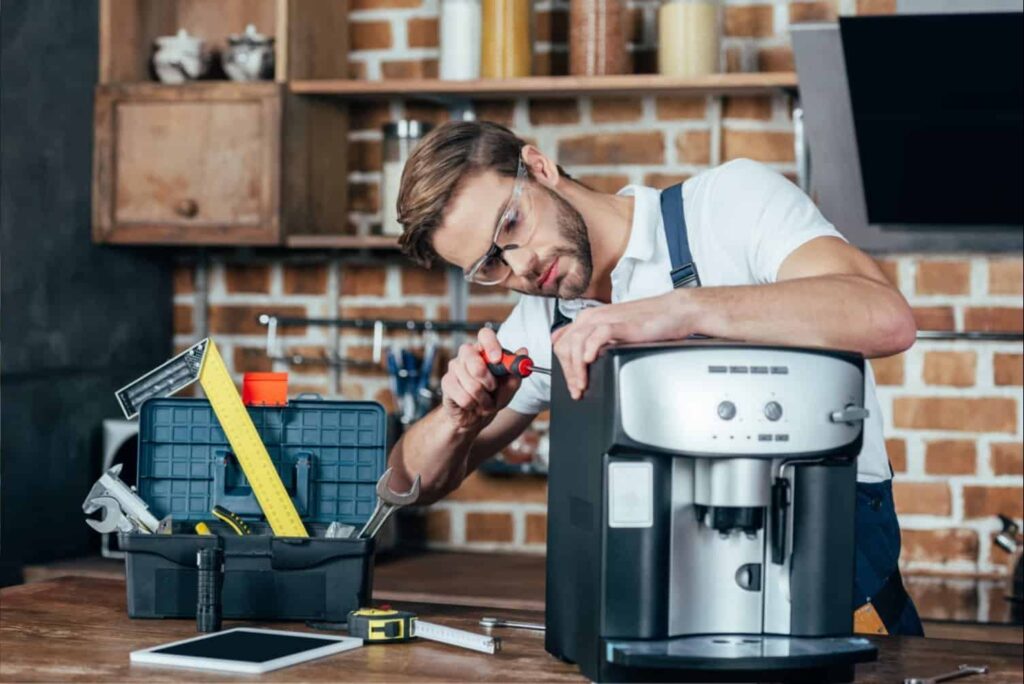Wondering how to become an espresso machine technician? Becoming one is an exciting and rewarding career path for those who love coffee and have a knack for mechanics. This role involves maintaining, repairing, and sometimes installing machines in various settings, from coffee shops and restaurants to offices and homes. Technicians may work on various types of machines, including those with a double boiler system.
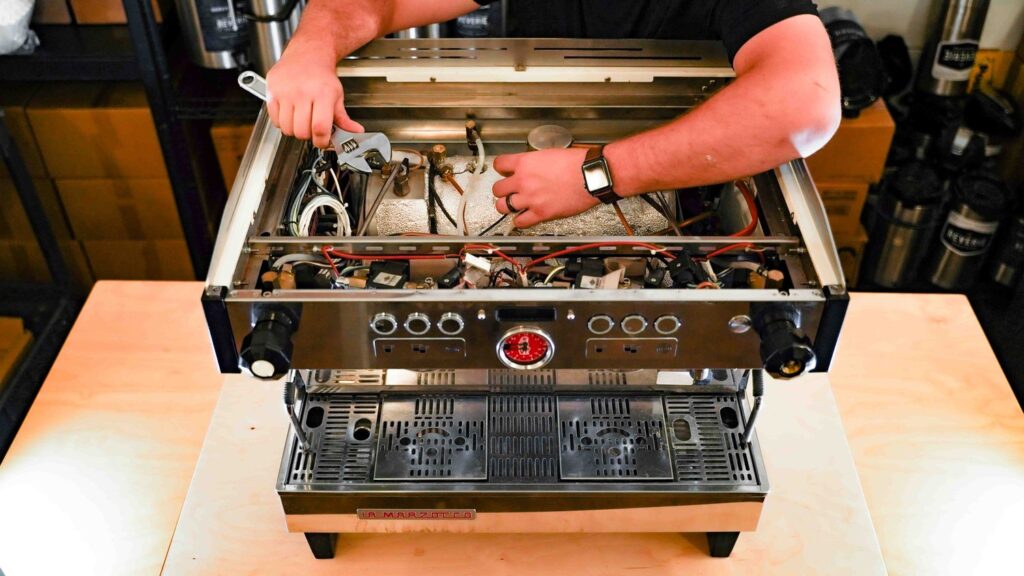
Benefits of the Career:
-
High Demand: With the booming coffee culture, skilled espresso machine technicians are always in demand.
-
Good Pay: Technicians can earn a decent wage, with opportunities for overtime and bonuses.
-
Variety of Work: Each day can bring new challenges and different types of machines to work on.
-
Job Satisfaction: There’s a unique satisfaction in keeping coffee flowing smoothly for businesses and individuals.
Opportunities in the Field:
-
Work in Cafes and Restaurants: Many technicians find employment servicing machines in commercial settings.
-
Start Your Own Business: There’s potential to start a repair business catering to local establishments.
-
Work for Manufacturers: Some technicians work directly for espresso machine manufacturers, providing specialized repair and maintenance services.
-
Training and Consultancy: Experienced technicians can move into roles where they train new technicians or consult on machine purchases and maintenance plans.
Embarking on this career path means combining a passion for coffee with technical skills, offering a fulfilling and dynamic professional life.
Understanding the Role of an Espresso Machine Technician
An espresso machine technician specializes in maintaining, repairing, and sometimes installing espresso machines. Their primary goal is to ensure these machines operate efficiently, providing high-quality espresso shots every time.
These technicians can work in various environments, including coffee shops, restaurants, offices, and even residential settings. They may be employed by coffee machine manufacturers, repair service companies, or operate as independent contractors.
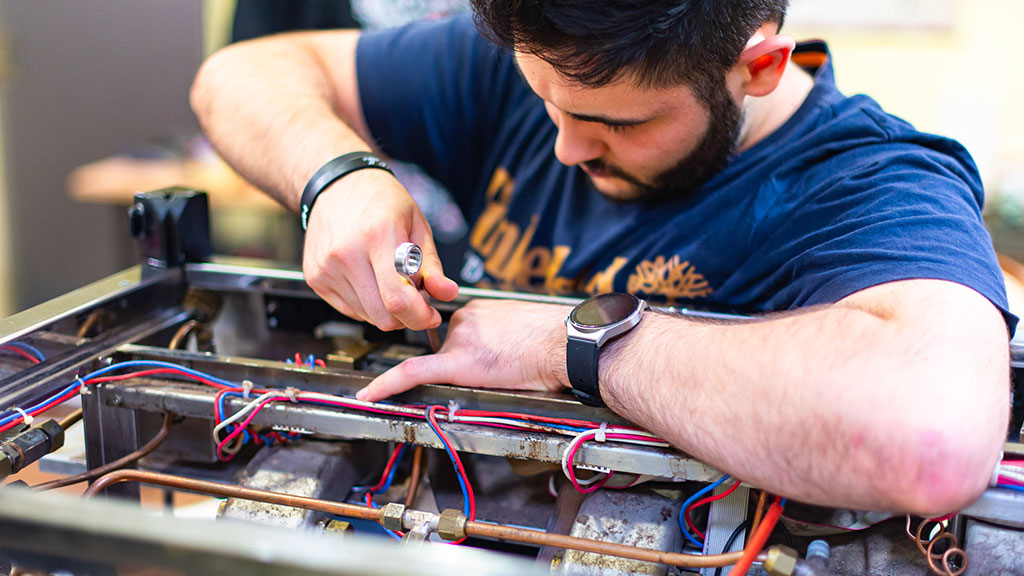
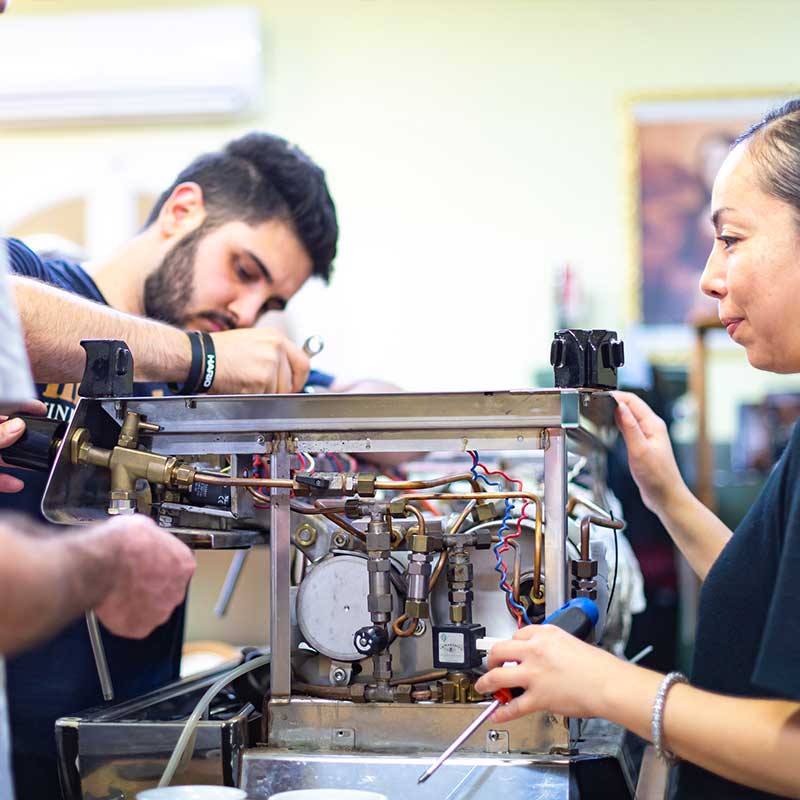
Daily Responsibilities and Preventive Maintenance
-
Routine Maintenance: Regularly checking and cleaning machines to prevent malfunctions.
-
Diagnosing Issues: Identifying problems with espresso machines and determining the best course of action for repairs.
-
Repairing Machines: Fixing or replacing faulty components to restore the machine’s functionality.
-
Installation: Setting up new machines and ensuring they are correctly configured for optimal performance and high-quality espresso extraction.
-
Customer Service: Interacting with clients to understand their issues, providing technical advice, and ensuring customer satisfaction.
-
Record Keeping: Maintaining logs of maintenance and repairs performed, including parts used and time spent on each job.
-
Ordering Parts: Keeping track of inventory and ordering necessary parts for repairs and maintenance.
-
Staying Updated: Keeping up-to-date with the latest technology and advancements in espresso machines.
-
Multimeter: Used to measure electrical values like voltage, current, and resistance in espresso machines.
-
Screwdrivers and Wrenches: Essential for opening machine panels and accessing internal components.
-
Pressure Gauges: Used to check and adjust the pressure settings of the machine.
-
Cleaning Supplies: Brushes, descaling solutions, and cleaning cloths for routine maintenance.
-
Replacement Parts: A stock of common replacement parts like gaskets, seals, and valves.
-
Calibration Tools: For ensuring the machine’s settings are accurate and delivering the best quality espresso.
-
Diagnostic Software: Some advanced machines come with software that helps diagnose issues and monitor performance.
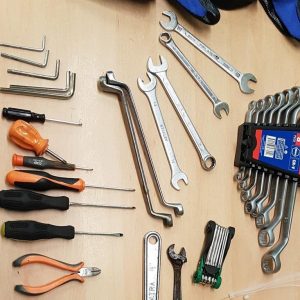

Espresso machine technicians play a crucial role in the coffee industry, ensuring that machines operate smoothly and consistently produce high-quality espresso. Their technical expertise and attention to detail help maintain the standards that coffee lovers expect.
Foundation Knowledge
Understanding the foundational knowledge of coffee equipment is crucial for any aspiring espresso machine technician. This section delves into the basics, covering the different types of espresso machines, coffee grinders, and water treatment systems that are essential in the coffee industry.
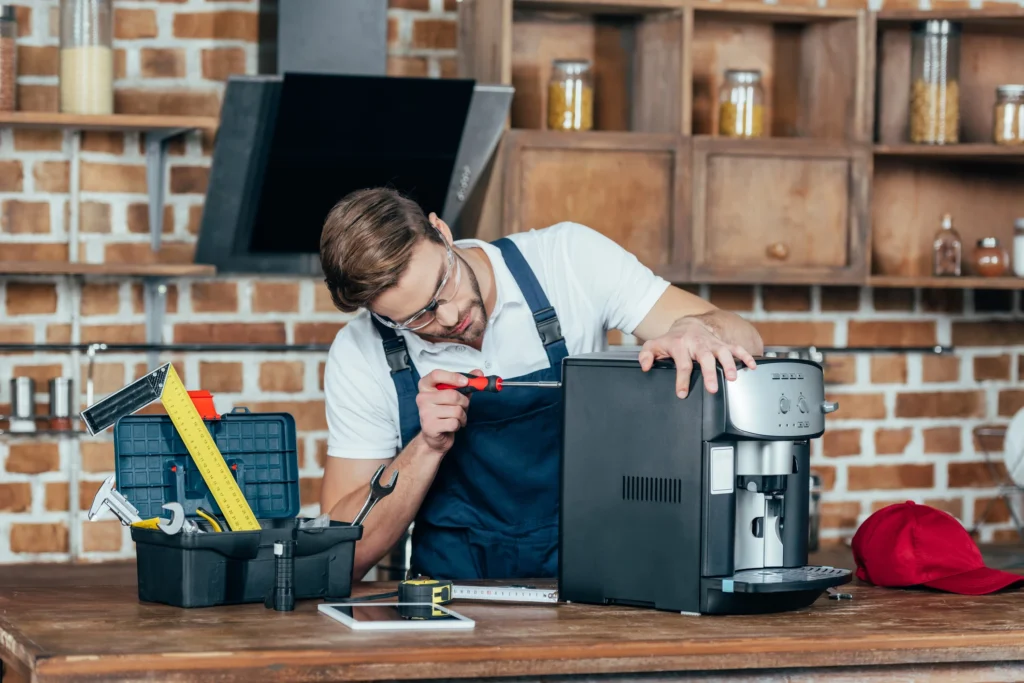
Required Skills and Qualifications
To succeed as an espresso machine technician, you need a combination of technical expertise, customer service skills, and a passion for coffee. Here’s a breakdown of the essential skills and qualifications for this role:
Technical Skills:
-
Machine Repair and Maintenance:
-
Mechanical Aptitude: Understanding the mechanics of espresso machines, including pumps, boilers, grinders, and steam wands.
-
Troubleshooting: Ability to diagnose and fix issues quickly and efficiently.
-
Electrical Knowledge: Basic understanding of electrical systems and components within espresso machines.
-
Fundamental Operating Principles: Understanding the fundamental operating principles of electrical systems is crucial for safely working with coffee equipment.
-
-
Precision and Attention to Detail: Ensuring all components are correctly assembled and calibrated.
-
Diagnostic Skills:
-
Problem-Solving: Identifying issues through systematic troubleshooting and using diagnostic tools.
-
Analytical Thinking: Interpreting diagnostic results to determine the best course of action for repairs.
-
Technical Proficiency:
-
Using Tools: Proficient with hand tools, multimeters, pressure gauges, and other specialized equipment.
-
Reading Schematics: Understanding machine diagrams and schematics to identify parts and repair needs.
-
Preventive Maintenance:
-
Routine Checks: Performing regular maintenance to prevent breakdowns and prolong the lifespan of machines.
-
Cleaning and Calibration: Ensuring machines are clean and properly calibrated for optimal performance.
Customer Service Skills:
-
Communication Skills:
-
Clear Explanations: Ability to explain technical issues and repair processes to customers in an understandable way.
-
Listening: Actively listening to customers’ concerns and questions to provide accurate solutions.
-
Customer Interaction:
-
Professionalism: Maintaining a courteous and professional demeanor during all customer interactions.
-
Patience: Being patient with customers who may be frustrated with their machine issues.
-
Customer Satisfaction:
-
Empathy: Understanding the importance of the espresso machine to the customer’s business or personal use.
-
Responsiveness: Promptly responding to service calls and addressing issues efficiently.
-
Sales Skills:
-
Product Knowledge: Recommending replacement parts, upgrades, or new machines when appropriate.
-
Upselling Services: Suggesting additional maintenance services to keep machines in top condition.
To thrive as an espresso machine technician, a blend of these technical and customer service skills is essential. This combination ensures that machines are maintained and repaired effectively while also providing excellent customer experiences.
Educational Pathways
While there is no single set educational path to becoming an espresso machine technician, certain educational and training avenues can significantly boost your chances of success in this field. Here’s a guide on the necessary and optional educational steps:
Basic Educational Requirements:
-
High School Diploma or Equivalent: The minimum educational requirement typically includes a high school diploma or GED. Courses in mathematics, physics, and electronics can be particularly beneficial.
Technical Training Programs
-
Vocational Schools and Community Colleges:
-
Many vocational schools and community colleges offer programs in appliance repair, electrical systems, and mechanical engineering, which provide a solid foundation for understanding espresso machines.
-
Courses in these programs often cover topics like electrical circuits, troubleshooting techniques, and mechanical systems.
-
Specialized Coffee Machine Training:
-
Some institutions offer specialized training programs specifically focused on espresso machines. These courses cover the intricacies of espresso machine operation, maintenance, and repair, including topics like common water treatment systems.
-
Look for programs endorsed by major espresso machine manufacturers, as they often provide the most relevant and up-to-date training.
-
Apprenticeships:
-
Apprenticeships provide hands-on experience under the guidance of experienced technicians. This on-the-job training is invaluable for gaining practical skills and knowledge.
-
Many coffee machine service companies offer apprenticeship programs, which typically last from a few months to a couple of years.
Certifications Worth Pursuing
-
Certified Technician Programs:
-
Certified Espresso Machine Technician (CEMT): This certification demonstrates a comprehensive understanding of espresso machine mechanics, maintenance, and repair.
-
Manufacturer Certifications: Many espresso machine manufacturers, such as La Marzocco, Breville, and Rancilio, offer certification programs for technicians trained to service their specific models.
-
-
General Appliance Repair Certifications:
-
Professional Service Association (PSA): Offers certifications for appliance repair technicians, including those specializing in coffee machines.
-
National Appliance Service Technician Certification (NASTeC): Recognized certification for appliance repair professionals, which can be beneficial for espresso machine technicians.
-
-
Electrical and Mechanical Certifications:
-
Journeyman Electrician License: If the role involves significant electrical work, obtaining an electrician’s license can be beneficial.
-
Mechanical Engineering Certifications: For those with a more technical background, certifications in mechanical engineering can enhance understanding and credibility.
-
-
Barista Certifications:
-
While not directly related to machine repair, barista certifications from organizations like the Specialty Coffee Association (SCA) can provide valuable insights into how espresso machines are used and what users expect from them.
-
Pursuing these educational pathways and certifications not only enhances your technical skills but also boosts your credibility and job prospects in the competitive field of espresso machine repair.
Gaining Experience
Gaining practical experience is crucial for becoming a proficient espresso machine technician. Hands-on experience helps you understand the nuances of different machines and develop the skills needed to troubleshoot and repair them effectively. Here are some ways to get started:
Entry-Level Jobs:
-
Assistant Technician:
-
Start by working as an assistant to experienced technicians. This role allows you to learn on the job and gradually take on more responsibilities.
-
Look for positions at coffee machine repair shops, appliance repair companies, or coffee equipment suppliers.
-
-
Barista:
-
Working as a barista can provide valuable insights into the daily operation and maintenance of espresso machines.
-
Many coffee shops offer in-house training on machine maintenance, giving you a practical understanding of common issues and basic troubleshooting.
-
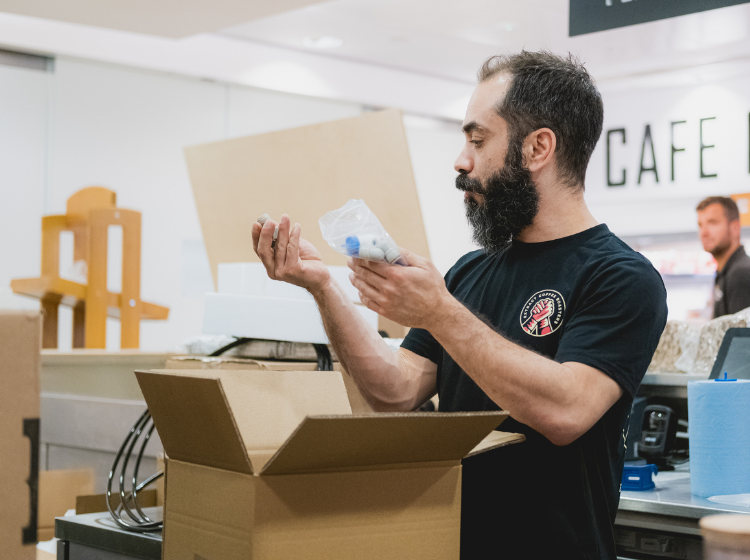

-
Manufacturer Programs:
-
Many espresso machine manufacturers offer internships and apprenticeships. These programs provide in-depth training on their specific models and maintenance procedures, including the maintenance of water treatment system components.
-
Companies like La Marzocco, Breville, and Rancilio often have apprenticeship programs for aspiring technicians.
-
Service Companies:
-
Coffee machine service companies frequently offer apprenticeships that provide hands-on training and experience.
-
These apprenticeships typically involve shadowing experienced technicians, learning diagnostic techniques, and performing basic repairs under supervision.
-
Vocational Training Programs:
-
Some vocational schools and community colleges partner with local businesses to offer internships as part of their technical training programs.
-
These internships provide practical experience and often lead to job placements after completion.
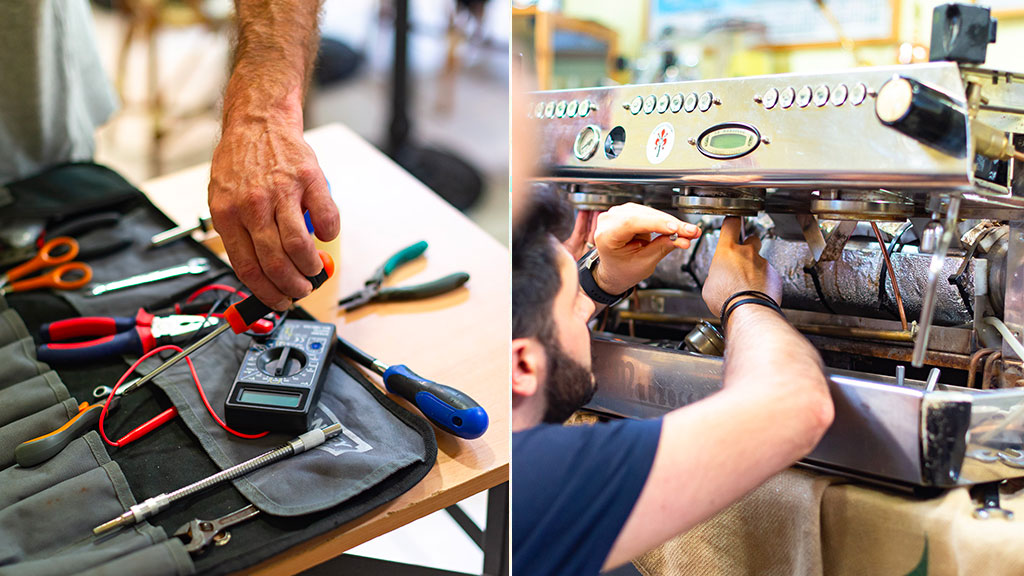
-
Volunteering:
-
Offer your services to local non-profit organizations, community centers, or small coffee shops that may need help maintaining their espresso machines.
-
Volunteering provides real-world experience, enhances your resume, and helps build a network of contacts in the coffee supply chain.
-
-
Freelance Work:
-
Start by offering freelance repair services to friends, family, and local businesses. Promote your services through social media and local advertising.
-
Freelance work allows you to gain diverse experience by working on different machine models and types, which broadens your skill set.
-
-
Online Marketplaces:
-
Platforms like Upwork, TaskRabbit, or Craigslist can help you find freelance gigs. Many small businesses and individuals look for affordable repair services on these sites.
-
These opportunities help you build a portfolio of successful repairs and satisfied clients.
-
-
Networking:
-
Attend coffee trade shows, barista competitions, and industry events to meet professionals and potential clients.
-
Networking can lead to job opportunities, freelance gigs, and valuable mentorships.
-
Building experience as an espresso machine technician involves a combination of formal training, hands-on practice, and networking. Starting with entry-level jobs, internships, and apprenticeships provides a strong foundation, while volunteering and freelance work offer additional opportunities to hone your skills and expand your professional network.
Equipment Maintenance
Building on the foundational knowledge, this section focuses on the practical aspects of maintaining coffee equipment. Proper maintenance of espresso machines, including semi-automatic and traditional models, as well as water treatment systems, is crucial for optimal performance.
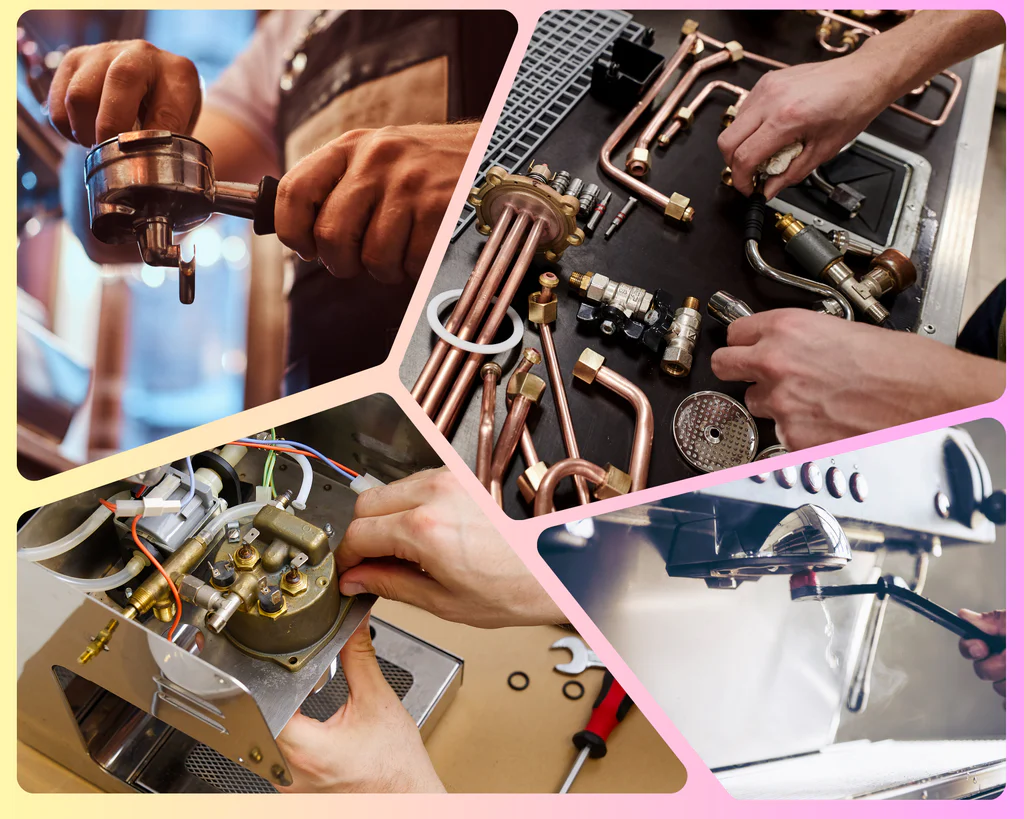
Advancing in Your Career
Once you’ve gained some experience as an espresso machine technician, there are several strategies to help you advance your career. Here are some tips to keep you moving forward:
-
Stay Updated:
-
Continuously educate yourself about the latest models and technological advancements in espresso machines.
-
Subscribe to industry publications, join professional associations, and participate in online forums and communities.
-
-
Seek Feedback:
-
Regularly ask for feedback from clients and colleagues to identify areas for improvement.
-
Use this feedback to refine your skills and enhance your service quality.
-
-
Build a Strong Network:
-
Attend industry events, trade shows, and barista competitions to meet other professionals and potential clients.
-
Join professional organizations like the Specialty Coffee Association (SCA) to network and stay informed about industry trends.
-
-
Develop a Niche:
-
Consider specializing in a particular type of machine or service, such as high-end commercial machines or specific brands.
-
Building a reputation as an expert in a niche area can lead to more job opportunities and higher pay.
-
-
Enhance Customer Service Skills:
-
Excellent customer service can set you apart from competitors and lead to repeat business and referrals.
-
Develop strong communication skills, professionalism, and a customer-focused attitude.
-
Specialization Opportunities in Espresso Extraction
-
Commercial Machines:
-
Specializing in commercial espresso machines used in cafes, restaurants, and offices can be highly lucrative.
-
These machines are often more complex and require a deeper understanding of high-volume usage and maintenance.
-
-
Home Machines:
-
Many coffee enthusiasts invest in high-end home espresso machines. Specializing in this area allows you to cater to a growing market of home baristas.
-
Providing personalized service and maintenance plans can set you apart in this niche.
-
-
Brand-Specific Expertise:
-
Becoming an expert in servicing specific brands, like La Marzocco, Breville, or Rancilio, can make you a sought-after technician.
-
Manufacturer certifications and training programs can enhance your credibility and expertise in particular brands.
-
-
Training and Consultancy:
-
Experienced technicians can transition into roles where they train new technicians or consult on machine purchases and maintenance plans.
-
Offering workshops, courses, or personalized training sessions can diversify your career opportunities.
-
Further Education and Training
-
Advanced Technical Courses:
-
Enroll in advanced courses that cover more complex aspects of espresso machine repair and maintenance.
-
Topics can include advanced electrical diagnostics, mechanical engineering principles, and software troubleshooting.
-
-
Manufacturer Training Programs:
-
Participate in advanced training programs offered by espresso machine manufacturers.
-
These programs often provide in-depth knowledge of new models, advanced repair techniques, and proprietary technologies.
-
-
Business Management Courses:
-
If you’re considering starting your own repair business, taking courses in business management, marketing, and customer service can be highly beneficial.
-
Understanding business operations, financial management, and customer acquisition strategies can help you successfully run your own company.
-
-
Certifications and Licenses:
-
Pursue additional certifications in appliance repair, electrical structure, or mechanical engineering to enhance your qualifications.
-
Certifications like the Journeyman Electrician License or advanced mechanical engineering certifications can open up new career opportunities.
-
-
Continuing Education:
-
Stay engaged with continuing education opportunities through professional organizations like the Specialty Coffee Association (SCA).
-
Regularly attending workshops, webinars, and industry conferences can keep your skills sharp and knowledge current.
-
Advancing your career as an espresso machine technician involves a combination of staying updated with industry trends, specializing in niche areas, and pursuing further education and training. By continuously improving your skills and expanding your knowledge, you can achieve greater success and recognition in the field.
Advanced Topics
For those who have mastered the basics and routine maintenance, this section delves into advanced topics, including the repair and maintenance of complex espresso machines, the use of specialized tools, and the latest developments in coffee technology.
Job Market and Opportunities
The job market for espresso machine technicians is robust and continually growing, driven by the increasing popularity of coffee culture worldwide. As more cafes, restaurants, and even offices invest in high-quality espresso machines, the demand for skilled technicians who can maintain and repair these machines is on the rise. Here’s a closer look at the current job market and future opportunities:
Current Job Market:
-
High Demand:
-
The rising number of coffee shops and specialty cafes has led to a growing need for professional technicians.
-
The trend of home espresso machines is also increasing, creating more opportunities in residential sectors.
-
-
Steady Employment:
-
Technicians enjoy steady employment as espresso machines require regular maintenance and occasional repairs.
-
The consistent need for these services ensures a reliable job market.
-
Future Opportunities:
-
Technological Advancements:
-
As espresso machines become more advanced with new features and technologies, the need for knowledgeable technicians will increase.
-
Technicians who stay updated with the latest technology will be in high demand.
-
-
Expansion of Coffee Culture:
-
The global expansion of coffee culture means more opportunities for technicians in emerging markets.
-
Growth in countries with developing coffee scenes opens new job prospects.
-
-
Sustainable Practices:
-
An increasing focus on sustainability and eco-friendly practices in the coffee bean industry may lead to new roles for technicians specializing in energy-efficient and sustainable machine solutions.
-
Employment Sectors
-
Coffee Shops and Cafes:
-
Local and chain coffee shops often employ technicians to maintain and repair their machines, ensuring consistent quality for their customers.
-
-
Restaurants and Hotels:
-
Restaurants and hotels with espresso machines require regular maintenance services to cater to their guests’ coffee needs.
-
-
Offices and Corporate Settings:
-
Many offices invest in high-quality espresso machines for employee use, creating opportunities for in-house or contracted technicians.
-
-
Appliance Repair Companies:
-
Companies that offer appliance repair services often have dedicated espresso machine technicians to handle specialized repairs.
-
-
Espresso Machine Manufacturers:
-
Manufacturers employ technicians to provide after-sales service, warranty repairs, and technical support.
-
-
Freelance and Independent Contractors:
-
Many technicians work independently, offering freelance repair services to a variety of clients, including residential and commercial customers.
-
Salary Expectations and Growth Potential
-
Salary Ranges:
-
Entry-Level Technicians: Can expect to earn between $30,000 to $40,000 annually, depending on location and employer.
-
Experienced Technicians: With several years of experience, salaries typically range from $45,000 to $60,000 per year.
-
Specialized Technicians: Those with advanced skills or manufacturer certifications can earn upwards of $70,000 annually.
-
-
Growth Potential:
-
Skill Development: Technicians who continually develop their skills and gain certifications can move into higher-paying roles.
-
Specialization: Specializing in high-end commercial machines or specific brands can lead to increased demand and higher earnings.
-
Business Ownership: Starting your own repair service can significantly increase earning potential, especially with a strong client base and good reputation.
-
Consulting and Training: Experienced technicians can transition into consulting roles, training new technicians, or advising businesses on machine maintenance and purchases.
-
The career of an espresso machine technician offers a promising future with numerous opportunities for advancement. As the demand for high-quality coffee continues to grow, so too does the need for skilled technicians to keep the machines running smoothly.
FAQS
What Do You Learn in an Espresso Machine Repair Training Course?
This course covers the fundamentals of how an espresso machine works, including understanding hydraulic systems, electrical components, and chemistry of water. It also focuses on preventive maintenance practices and troubleshooting common problems like leaks or heating issues. Training often includes hands-on experience with coffee machines, semi-automatic machines, and double boiler systems to ensure a comprehensive understanding.
What Tools Are Required for Espresso Machine Repair?
You’ll need both specialized and general tools, including electrical testing tools to measure voltage, and various hand tools for working on individual parts. For servicing coffee grinders and semi-automatic machines, precision tools are necessary to maintain safe and appropriate use. Advanced repairs may require knowledge of heat exchangesystems and replacing competition shower heads.
Can You Learn Espresso Machine Repair Online?
Yes, many training programs offer an online course option that covers theoretical concepts like water systemdynamics, multi-boiler functionality, and preventive maintenance techniques. Programs often include a course calendar to help students track progress and ensure the successful completion of their training.
What Role Does Knowledge of Brewing Play in Machine Repair?
Understanding the brewing process is essential for diagnosing issues with coffee grinders, batch brewers, and traditional espresso machine. For instance, misaligned shower heads or incorrect water chemistry can impact the quality of the espresso, making it vital to connect brewing knowledge with repair skills.
Are There Programs with Hands-On Learning?
Yes, many repair training programs include hands-on workshops with an excellent instructor guiding students. These sessions focus on practical repairs, such as calibrating coffee grinders, servicing double boiler systems, and troubleshooting common problems like clogged filters or faulty wiring in coffee machines.
Why is Preventive Maintenance Important in Espresso Machines?
Regular preventive maintenance helps extend the life of espresso machines by preventing costly breakdowns. Tasks include descaling the water system, cleaning shower heads, and maintaining batch brewers. This proactive approach reduces wear and tear on individual parts, ensuring optimal performance.
What Knowledge is Needed to Become an Espresso Machine Technician?
Becoming a technician requires a solid foundation in mechanical systems, electricity, and water chemistry. Additional knowledge of multi-boiler and heat exchange systems, as well as the operation of semi-automatic machines, is critical for troubleshooting and repairing coffee machines effectively. Familiarity with common problems and the ability to use electrical testing tools is also essential.

